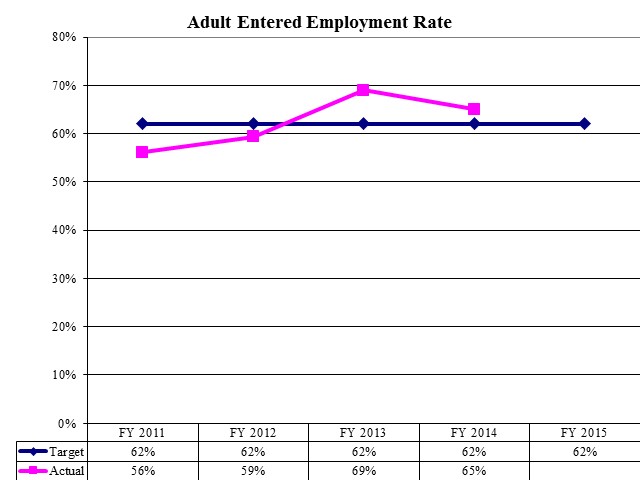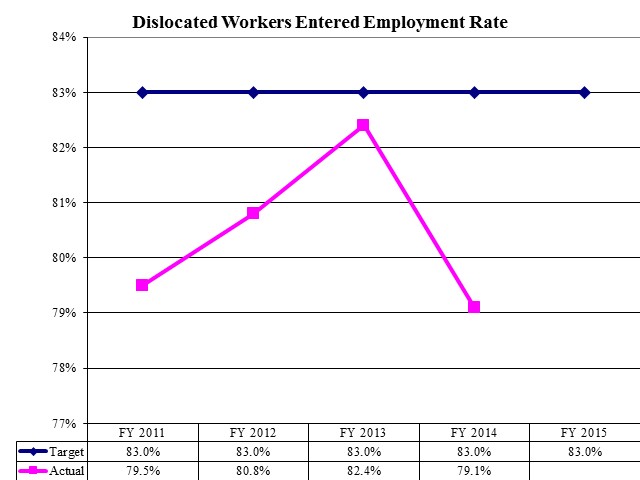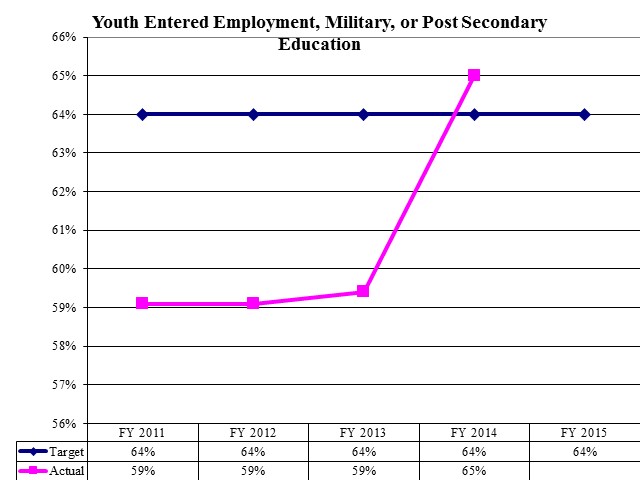This federally funded program prepares low-income youth, adults and dislocated workers, and persons with other barriers for employment. The program makes funding available to eligible job seekers for vocational training, education, job search assistance, and other support services. For FY 2014, 11,169 individuals were assisted by WIA training for adults, youth, and dislocated workers.
During the 2015 General Session, the Legislature appropriated for Fiscal Year 2016, $7,500,000 from all sources for Workforce Investment Act Assistance. This is a 0 percent change from Fiscal Year 2015 revised estimated amounts from all sources.
For the most recent completed fiscal year, the following information represents the purposes for which the money was used:

Adult Entered Employment Rate

Dislocated Workers Entered Employment Rate

Youth Entered Employment, Military, or Post Secondary Education

Training for Adults: Provides assistance with job training by arranging for an employment counselor to meet with an applicant and develop and complete an employment plan.
Eligibility: Eligibility is situational and not based on income or assets. The applicant must be a U.S. citizen or an employment-eligible non-citizen and must also:
- meet with an employment counselor to develop an employment plan;
- follow the plan and make progress toward the plan goals; and
- stay in touch with the employment counselor.
When post-secondary training has been negotiated, the applicant must:
- select training for a "demand" occupation; and
- complete the training as quickly as is reasonable.
If approved, an applicant may be able to get a bachelor's or master's degree, if it can be obtained within 24 months.
Amounts/Restrictions: Up to $6,000 per "exposure" (exposure is up to 24 months). Under certain circumstances, amount may be increased up to $8,000 with a supervisor waiver.
Training for Youth: Provides assistance to young people with preparing for and finding employment, as well as getting a high school diploma/GED, by working with an employment counselor. The program assists young people to: stay in school; learn better study skills; receive tutoring; get into alternative education programs; obtain summer employment; obtain work experience; pay for post-secondary education and vocational education; obtain leadership development opportunities; receive mentoring; and receive guidance counseling with substance abuse prevention. For FY 2014, 2,912 individuals were assisted by the Training for Youth WIA program.
Eligibility: Eligibility is situational and not based on income or assets. Program is provided to youth (ages 14-21) who are typically low-income and have one or more circumstances that interfere with their ability to complete an educational program or obtain and keep employment. An applicant must:
- apply for services and meet with an employment counselor;
- take a test to determine academic levels in reading, math, and language;
- write an employment plan;
- follow the plan and make progress toward goals; and
- complete activities on the plan.
Amounts/Restrictions: Up to $6,000 per "exposure" (exposure is up to 24 months). Under certain circumstances, amount may be increased to $8,000 with a supervisor waiver.
Training for Dislocated Workers: The program provides assistance with training for and obtaining employment by working with an employment counselor to develop an employment plan. For FY 2014, 2,912 individuals were assisted by the Dislocated Worker WIA program.
Eligibility: An applicant must meet the dislocated worker definition in the last 24 months, which includes:
- an individual who has been laid off or separated from work;
- an individual who has been laid off from work;
- a displaced homemaker; or
- a military spouse who leaves a job to follow a spouse to a permanent change of military station or after a military spouse discharge.
A U.S. citizen or an employment-eligible non-citizen:
- meets with an employment counselor to develop an employment plan;
- follows the plan and makes progress toward the plan's goals; and
- stays in touch with an employment counselor.
When postsecondary training has been negotiated, the applicant must:
- select a demand occupation; and
- complete training as quickly as is reasonable.
Amounts/Restrictions: Up to $6,000 per "exposure" (exposure is up to 24 months). Under certain circumstances, amount may be increased to $8,000 with a supervisor waiver.
COBI contains unaudited data as presented to the Legislature by state agencies at the time of publication. For audited financial data see the State of Utah's Comprehensive Annual Financial Reports.